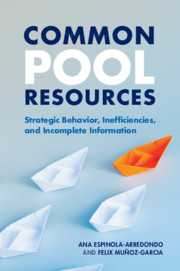Book contents
- Frontmatter
- Contents
- List of Figures
- List of Matrices
- Preface
- 1 Introduction
- 2 Common Pool Resources in a Static Setting
- 3 Common Pool Resources in a Dynamic Setting
- 4 Entry Deterrence in the Commons
- 5 Repeated Interaction in the Commons
- 6 Commons under Incomplete Information
- 7 Signaling in the Commons
- Appendix A Game Theory Tools
- Appendix B Solutions to Selected End-of-Chapter Exercises
- Bibliography
- Index
Appendix A - Game Theory Tools
Published online by Cambridge University Press: 03 August 2023
- Frontmatter
- Contents
- List of Figures
- List of Matrices
- Preface
- 1 Introduction
- 2 Common Pool Resources in a Static Setting
- 3 Common Pool Resources in a Dynamic Setting
- 4 Entry Deterrence in the Commons
- 5 Repeated Interaction in the Commons
- 6 Commons under Incomplete Information
- 7 Signaling in the Commons
- Appendix A Game Theory Tools
- Appendix B Solutions to Selected End-of-Chapter Exercises
- Bibliography
- Index
Summary
We next provide a list of basic tools on game theory that are recurrently used throughout this book. For a more detailed presentation, see Tadelis (2013) and Muñoz-Garcia and Toro-Gonzalez (2019).
BACKGROUND
Consider a setting with N ≥ 2 players (e.g., firms exploiting a CPR), each choosing a strategy sifrom a set of available strategies Si(known as the “strategy set”). In a CPR context, strategy sirepresents the tons of fish that fisherman iappropriates out of the range of feasible appropriation levels. For instance, if it is technologically impossible to appropriate more than 10 tons of fish, the strategy set would be the real numbers between 0 and 10, i.e., Si= [0, 10]. Similarly, let sjrepresent player j 's strategy,where j_= i , from his strategy set Sj ,which may differ from player i ’s, Si , if each firm has access to different technologies; otherwise, Si= Sj= S. For compactness, we often use (si,s −i)to denote a strategy profile where player ichooses siwhile his rivals select s −i , defined as
Finally, we assume that players are rational,meaning that they seek to maximize their payoff function, and that this is common knowledge. In a two-player game, this entails that player 1 tries to maximize his payoff, that player 2 knows that player 1 seeks to maximize his payoff, that player 1 knows that player 2 knows that he seeks tomaximize his payoff…and, so on, ad infinitum. Intuitively, this will help each player put himself in his rival's shoes, anticipating the actions that his rival chooses. For compactness, we refer to this assumption as “common knowledge of rationality.”
The following subsections present different solution concepts that seek to predict how players behave (e.g., which specific appropriation levels they choose) by relying on different behavioral assumptions.
STRICTLY DOMINATED STRATEGIES
In this first solution concept, rather than focusing on which specific strategies each player chooses to maximize his payoff, we seek to delete those strategies that a rational player would never select.
Information
- Type
- Chapter
- Information
- Common Pool ResourcesStrategic Behavior, Inefficiencies, and Incomplete Information, pp. 118 - 129Publisher: Cambridge University PressPrint publication year: 2021
